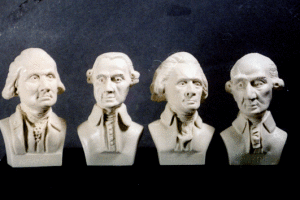I believe that most scholars can somewhat agree that the New Perspective on Paul (NPP) has, for the most part, been a reactionary movement against two historical trends: 1) studies that present Paul as radically different from fellow Jewish theologians of his day (i.e. seeing Paul as almost entirely Greek influenced versus being influenced by Judaism), and 2) what the NPP camp sees as an a-historical Reformation reading of Roman Catholic legalism into the audiences and context’s of Paul’s writing.
Yet, doesn’t taking the best parts of two original positions and mixing them together sound like a good recipe for finding the perfect, balanced blend (as evidenced in the invention of one of my favorite snacks, Chocolate-Covered Pretzels: the perfect blend of sweet and salty!)?
Well, trying to harmonize campus just for the sake of unity can be dangerous if theological peacemaking becomes the focus over study and sensitivity to the original texts. Yet, in my internet musings, I have come across someone who, out of careful immersion in the later, might lead us in a helpful step forward in the former.
Sigurd Grindheim (PhD., TEDS) , a Norwegian born and raised scholar at the Ethiopian Graduate School of Theology, has presented a proposal that affirms the existence of Luther’s “Theology of the Cross” in Paul, yet also recognizes the centrality of election (versus works-righteousness) as a major soteriological concept in Jewish and Pauline thought.
In his book The Crux of Election: Paul’s Critique of the Jewish Confidence in the Election of Israel, Grinheim argues (as many have) that Jesus and the cross is the lynch-pin of Paul’s theology, and that the Cross and Resurrection form the paradigm for all of Paul’s differentiation from his Jewish counterparts. Yet, Grinheim’s specific contribution is that the Paul finds the Cross is also the proper paradigm for understanding God’s election: God’s election is not unto privilege and elevation, but unto humiliation and weakness (see popular level summary of book here).
Thus, Paul criticizes his Jewish opponents and their theology that understood Israel’s election as a status claim, a reason of boasting, and a source of self-superiority. Grounded in 2 Cor 10-13, Paul’s most famous sarcastic passages seek to show the folly of boasting, especially a boasting in a theology of election that is clearly false because it is election leading to pride (and thus, patterned after the heart and ways of the world) versus “a paradigm demonstrated by Christ, in lowliness and humility, through crucifixion and subsequent election” (195). Paul’s opponents boasted in power. Paul boasted in Christ- the suffering servant.
Grindheim bolsters his argument with Philippians 3, where the obvious pattern for the Christian life is the deny all false identities and sources of gain, but to count these all as lost for Christ, who’s life of humiliation and later exaltation is the model for us to follow. And, in Romans 9-11, Grindheim see’s Paul explain of election to Gentile listeners as affirming Israel’s original election, one that is now interrupted by Gentile election and inclusion (in fact, because of her “status-election” way of thinking), and inclusion which God purposes provoke Israel by jealously back to Him… and to a proper understanding of election: God’s election is of the humble and lowly, to a life of humility and service (NOT of elitism and snobby privilege).
Perhaps most satisfying is that Grindheim doesn’t only see Paul developing this ‘humiliation theology’ from the Cross. In fact, Jesus and the Cross are actually fulfilling the same election typology found in the OT. Here, Israel’s OT election was from a family of nothings, and promised to be a great nation. And it is no irony that once she becomes a nation, Israel’s promises of kingdom, of land, and of Davidic rule are given to her in the troughs of her history (as the bullied school child amongst Canaanite nations, or in the midst of destruction and Exile in the prophets). And even then, this picture of a redeemed and blessed Israel is so that she might be a blessing to the nations. This stands in stark contrast to the election of Second Temple Judaism (as see in Sirach, Jubiliees, and some of 1 Enoch and Philo).
Although I would need to do more thinking about the thesis, I initially find if very insightful and helpful, for the following reasons:
1) It is a perspective that doesn’t deny writings and evidences of a Second Temple Judaism that saw election as the means of her salvation. However, because this brand of Judaism’s view of election is flawed (both outside the OT mold, contrary to the cross, and influenced by the world), an “Old Perspective” guy can see even this view of election as a form of human righteousness. Thus, this thesis shows how a focus on “staying in” versus “getting in” might be an unhelpful concept for helping us understand Paul’s relationship to his contemporaries.
2) It highlights the cross as the hermeneutical key to Paul’s theology. While it’s popular in academics today to see how similar Paul is to his Jewish counterparts, and less so when Paul’s differences are highlighted, we must note that Paul IS different, but he is different because of the Cross and the Christ event- note because of other cultural influences.
3) This interpretation is helpful for considerations for Spiritual formation. If correct, looking back on Paul’s dialogue with his opponents, the greatest tragedy of false head-theology is that it brings also a false and corrupt heart and life. Today, we too can easily be guilty of pride and arrogant thinking when we consider our election by God as NC believers, which can cause us to see ourselves as superior “pompous-piety-people” amidst a world of unworthy sinners. True spirituality is life lived in union with our suffering-servant-savior- a life of humility and lowliness, through the steps and by the footstool of our exalted King.





Leave a Reply
Your email is safe with us.